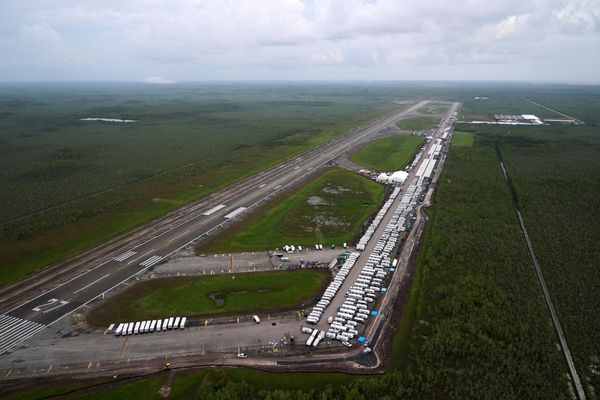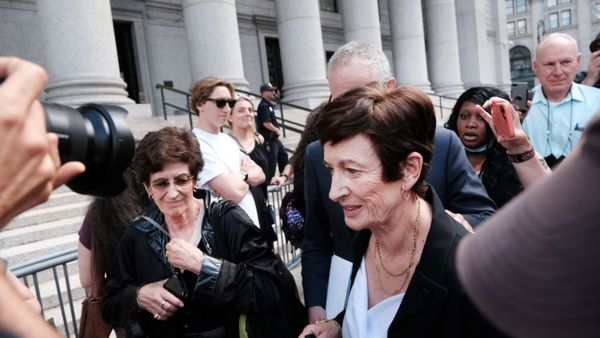
Stephen Ferrier writes: No amount of pressure on Qantas and its board will be enough to bring back some sort of justice to the Australian taxpayer and traveller (“Now it’s de-Joyced, Qantas should be returned to the people”). I 100% support the re-nationalisation of Qantas. We are paying for it anyway. And to think that the privatisation of Qantas, Telstra and CBA were done by a Labor government is doubly galling.
Patricia Berry writes: Qantas should be returned to the people. What has happened to it is a disgrace — it’s a profit-making machine for shareholders with no fear of collapse as taxpayers will always come to its rescue. The results of it being privately owned have shown us that it no longer represents ordinary Australians — only the wealthy. No national Australian flight company should be privately owned.
Steve Brennan writes: It’s long overdue for Alan Joyce to leave Qantas. He epitomises the capitalist ethos of profit at any cost filled by the insatiable greed of the few. When I worked in the corporate world an Alan Joyce would have been described as a “toe cutter” brought in to cut costs and boost profits.
Rodney Crute writes: Sorry to burst your view of Qantas before privatisation, but in the 1970s and into the ’80s it used management to do the work of employees who were on strike. In fact industrial disputes were more frequent then than now. My father worked for Qantas for about 10 years before his retirement and I recall him doing the work of those on strike.
Sam Carter writes: I recently travelled from Tasmania with a $4500 bike ($7500 to replace). The wheel rim was damaged despite being in a mountain bike-specific bag (it seemingly was dropped on the edge of a luggage bin or some other hard metal edge). I didn’t unpack it for about four weeks because I was using my other bike and had suffered an injury. When I did unpack it, I found the damage. Jetstar refused to pay to repair the rim (cost approximately $500) because I hadn’t opened the bag within three days.
The airline should have been nationalised to the tune of the $2 billion bailout of Qantas during COVID.
Richard Mills writes: Tom Ballard is spot on in this article. That’s why the best airlines for the passenger are all government-owned e.g. Etihad, Singapore, Emirates etc.
Considering Australia’s geography, a reliable national airline is an essential service. Qantas stopped caring about service years ago — I witnessed the change. It is process-driven, ruthless in its operational matrix and — from my lived experience over many years — places passenger comfort and well-being last, unfortunate members of the travelling public are simply the human fodder for its corporate greed. There is not a viable alternative as Virgin is just as bad although a little less pretentious and virtue-signalling.
Believe me, I should know after more than 50 years of flying regularly with Qantas. A pox on it, and a fond farewell to Joyce.
Feeling the heat
Darryl Whiteside writes: May I point out that Labor has been in government only 12 months, after being left with a trillion-dollar-plus debt and corruption in government at a level this nation has never before seen. Instead of joining the non-action, all-threats, protest party — the Greens — Australians should look at how much Labor has done in such a short time to start taking action on climate change. What I just read in “My future looks bleak, and Labor’s two-faced climate rhetoric achieves nothing” was straight out of the Greens playbook.
The main question is: do we really want another LNP government back in power before corruption and debt is cleaned up and public servants are reinstated and encouraged to give free and non-biased opinion to government without threat of dismissal? Just look at the opposition’s frontbench and ask the question would you really want it back in government in the next two or eight years? Well, would you?
Barnard Ward writes: I think Anjali Sharma went far too easy on the government. I think the government is seriously dragging the chain on just about everything it should be doing to help ordinary Australians live peaceful and productive lives. Cue here, of course, all the apologists wailing “We can’t afford it!” or “We can’t do everything at once!” Sorry, those excuses are just that: excuses.
Climate change is, in my view, the single most important issue affecting the ability of Australians to live peacefully; in fact, to live at all. I’m an old man. I quite possibly won’t see another general election. And for the same reason I probably won’t be too seriously affected by climate change — unless one of the seriously wild storms which turn up here far more frequently than they used to blow my solar panels off the roof, or the roof off the house, solar panels and all. But Sharma’s cohort and those who come after will bear the brunt of what looks to me like approaching catastrophe.
The government needs to get its finger out. In fact, we all should have got our fingers out 60 years ago, but were too stupid, or too brainwashed by the automotive industry, or the oil companies, or the coalminers, or whoever.
Ben Chapman writes: Look I’m the first to say that the Labor government hasn’t exactly come out of the gates at a pace on fixing endemic poverty and social problems, but nor has it been anywhere near as regressive as the Howard government. I also don’t agree with the kinds of analysis that say it’ll be steady as she goes and not much to see here etc forever. I don’t think it will be.
The government — like the country — is pretty conservative and wants to stay in power to stretch past the line where it had to promise to be conservative to get rid of the last lot. I’d say that more than anything is the reason Albanese is behaving the way he is. There are a lot of conservatives in the Labor Party and if you think the teals wouldn’t do a deal with a Dutton Coalition you’re fooling yourself. At least a few of them know the Labor preferences that got them elected last time aren’t enough for a viable coalition and will be courting the more reasonable sides of the white shoe brigade in their seats.
I hope Albanese gets it right and then does something with it. I think he will and I think he has earned the right to play it his way without being called a neoliberal scumbag after 12 months. The bloke has been in there 27 years — he really does understand the fickleness of the cycle and how quickly those who move quickly can come unstuck.
Grass isn’t Greener
Ute Mueller writes: This is not the first time the Greens have tried to jeopardise a good and
politically achievable bill in Parliament for the “vision” of a perfect one (“What would a Coalition or Labor minority government have delivered in the budget?”). Labor presented the most socially responsible budget in the past 20 years and the Greens think they could do better by joining ranks with the Liberals, the “no to everything party”, the party that neglected action on climate for a full decade and gave Australia the inexcusable robodebt that created havoc and misery in thousands of people’s lives. Not natural allies. They should be feeling very uncomfortable in that place.
They aren’t right either demonising all landlords as opportunistic. Didn’t they notice the sharp rise in their house insurance bill and council rates last year? My insurance went up again this year. If you rent a property you have to pay land tax as well. Most small landlords are people who have to make ends meet.
Down to brass tax
Richard Letts writes: The only reason for proceeding with the stage three tax cuts that I have seen stated by the government is that it promised to do so before it was elected (“The cruel and unfair stage three tax cuts will only worsen inequality”).
As I understand it, the government would be keeping a promise given by the Coalition when in government. Given the consequences described by Crikey, whatever the Coalition’s purpose it is not consistent with basic Labor principles. Was there ever a time when the policy supported Labor principles or any purpose stated by Labor other than the self-interested desire to be elected. As far as I know, it still has not given a principled justification for proceeding. It is difficult to believe that doing so will even bring it any benefit electorally. Meanwhile, massive benefits will be forgone by proceeding.
Museums of fine arts
Renzo Benedet writes: I refer to Ben Eltham’s article on January 31 this year headlined “Albanese government gets Australian culture down to a fine art”. In last week’s federal budget, money was set aside for the Revive program — and this was great to see. But I think there’s a gap in Revive — a gap relating to funding the many museums which are run by volunteers or by the community. They operate with no government support and they contribute enormously to our rich history.
I support artists of all genres being funded to express their creativity but feel the same way about museums’ creativity and wealth of historical information. It’s amazing how many volunteer-run museums there are, largely in regional centres, which generate tourism dollars.
If Revive is intended to give a leg up to our cultural identity and creativity, don’t forget community-based museums.







